Paper Menu >>
Journal Menu >>
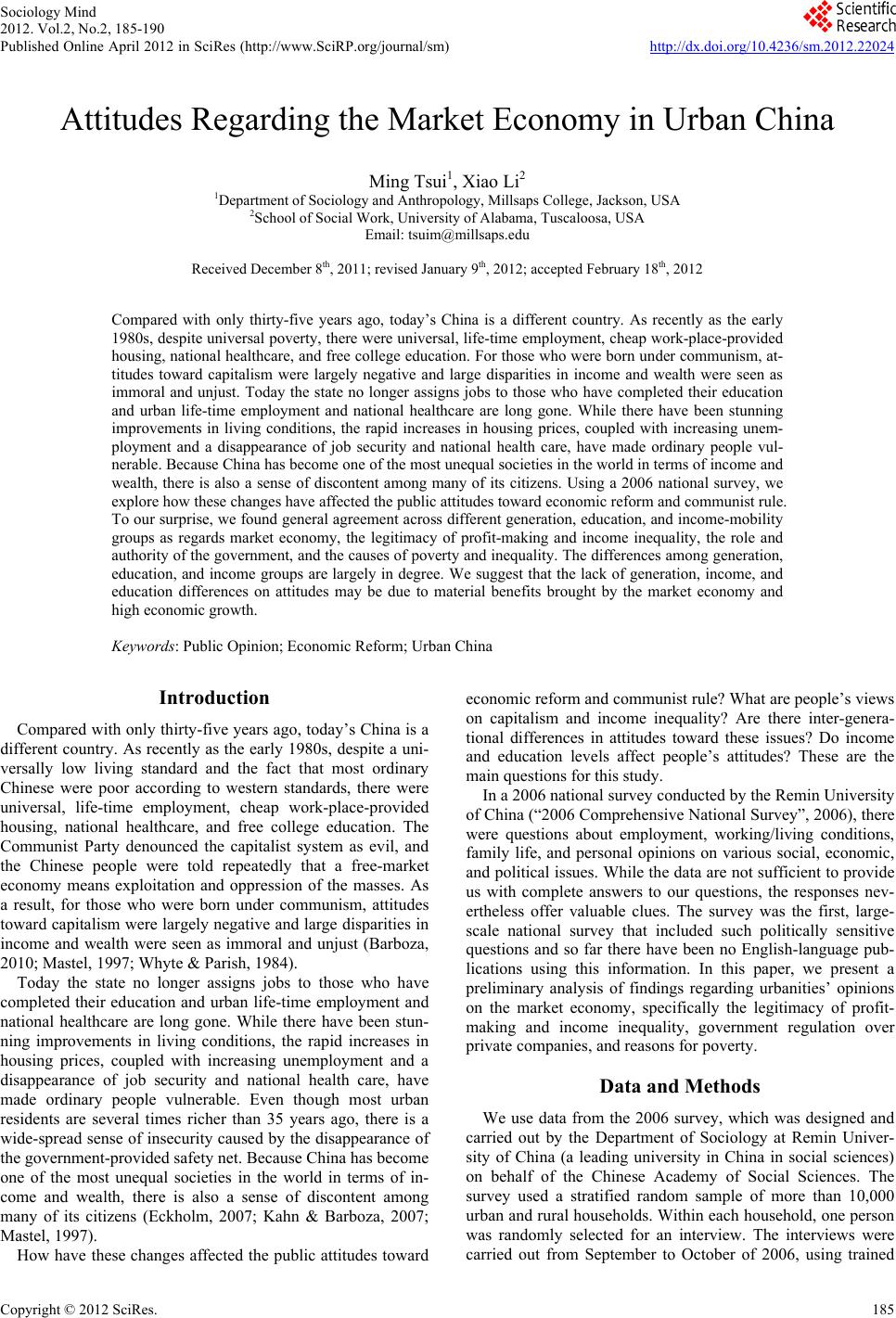 Sociology Mind 2012. Vol.2, No.2, 185-190 Published Online April 2012 in SciRes (http://www.SciRP.org/journal/sm) http://dx.doi.org/10.4236/sm.2012.22024 Copyright © 2012 SciRes. 185 Attitudes Regarding the Market Economy in Urban China Ming Tsui1, Xiao Li2 1Department of Sociology and Anthropology, Millsaps College, Jackson, USA 2School of Social Work, University of Alabama, Tuscaloosa, USA Email: tsuim@millsaps.edu Received December 8th, 2011; revised January 9th, 2012; accepted February 18th, 2012 Compared with only thirty-five years ago, today’s China is a different country. As recently as the early 1980s, despite universal poverty, there were universal, life-time employment, cheap work-place-provided housing, national healthcare, and free college education. For those who were born under communism, at- titudes toward capitalism were largely negative and large disparities in income and wealth were seen as immoral and unjust. Today the state no longer assigns jobs to those who have completed their education and urban life-time employment and national healthcare are long gone. While there have been stunning improvements in living conditions, the rapid increases in housing prices, coupled with increasing unem- ployment and a disappearance of job security and national health care, have made ordinary people vul- nerable. Because China has become one of the most unequal societies in the world in terms of income and wealth, there is also a sense of discontent among many of its citizens. Using a 2006 national survey, we explore how these changes have affected the public attitudes toward economic reform and communist rule. To our surprise, we found general agreement across different generation, education, and income-mobility groups as regards market economy, the legitimacy of profit-making and income inequality, the role and authority of the government, and the causes of poverty and inequality. The differences among generation, education, and income groups are largely in degree. We suggest that the lack of generation, income, and education differences on attitudes may be due to material benefits brought by the market economy and high economic growth. Keywords: Public Opinion; Economic Reform; Urban China Introduction Compared with only thirty-five years ago, today’s China is a different country. As recently as the early 1980s, despite a uni- versally low living standard and the fact that most ordinary Chinese were poor according to western standards, there were universal, life-time employment, cheap work-place-provided housing, national healthcare, and free college education. The Communist Party denounced the capitalist system as evil, and the Chinese people were told repeatedly that a free-market economy means exploitation and oppression of the masses. As a result, for those who were born under communism, attitudes toward capitalism were largely negative and large disparities in income and wealth were seen as immoral and unjust (Barboza, 2010; Mastel, 1997; Whyte & Parish, 1984). Today the state no longer assigns jobs to those who have completed their education and urban life-time employment and national healthcare are long gone. While there have been stun- ning improvements in living conditions, the rapid increases in housing prices, coupled with increasing unemployment and a disappearance of job security and national health care, have made ordinary people vulnerable. Even though most urban residents are several times richer than 35 years ago, there is a wide-spread sense of insecurity caused by the disappearance of the government-provided safety net. Because China has become one of the most unequal societies in the world in terms of in- come and wealth, there is also a sense of discontent among many of its citizens (Eckholm, 2007; Kahn & Barboza, 2007; Mastel, 1997). How have these changes affected the public attitudes toward economic reform and communist rule? What are people’s views on capitalism and income inequality? Are there inter-genera- tional differences in attitudes toward these issues? Do income and education levels affect people’s attitudes? These are the main questions for this study. In a 2006 national survey conducted by the Remin University of China (“2006 Comprehensive National Survey”, 2006), there were questions about employment, working/living conditions, family life, and personal opinions on various social, economic, and political issues. While the data are not sufficient to provide us with complete answers to our questions, the responses nev- ertheless offer valuable clues. The survey was the first, large- scale national survey that included such politically sensitive questions and so far there have been no English-language pub- lications using this information. In this paper, we present a preliminary analysis of findings regarding urbanities’ opinions on the market economy, specifically the legitimacy of profit- making and income inequality, government regulation over private companies, and reasons for poverty. Data and Methods We use data from the 2006 survey, which was designed and carried out by the Department of Sociology at Remin Univer- sity of China (a leading university in China in social sciences) on behalf of the Chinese Academy of Social Sciences. The survey used a stratified random sample of more than 10,000 urban and rural households. Within each household, one person was randomly selected for an interview. The interviews were carried out from September to October of 2006, using trained 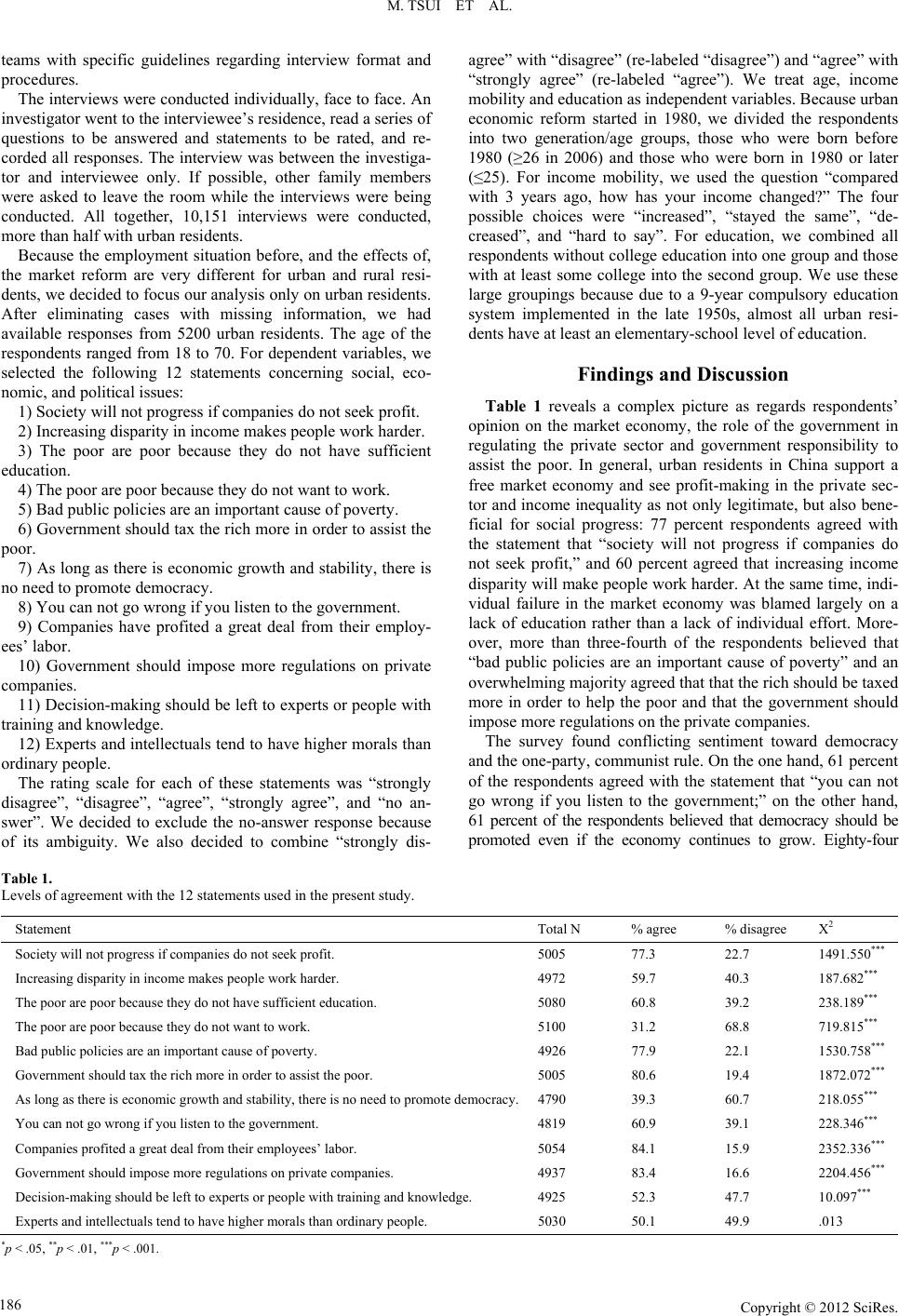 M. TSUI ET AL. teams with specific guidelines regarding interview format and procedures. The interviews were conducted individually, face to face. An investigator went to the interviewee’s residence, read a series of questions to be answered and statements to be rated, and re- corded all responses. The interview was between the investiga- tor and interviewee only. If possible, other family members were asked to leave the room while the interviews were being conducted. All together, 10,151 interviews were conducted, more than half with urban residents. Because the employment situation before, and the effects of, the market reform are very different for urban and rural resi- dents, we decided to focus our analysis only on urban residents. After eliminating cases with missing information, we had available responses from 5200 urban residents. The age of the respondents ranged from 18 to 70. For dependent variables, we selected the following 12 statements concerning social, eco- nomic, and political issues: 1) Society will not progress if companies do not seek profit. 2) Increasing disparity in income makes people work harder. 3) The poor are poor because they do not have sufficient education. 4) The poor are poor because they do not want to work. 5) Bad public policies are an important cause of poverty. 6) Government should tax the rich more in order to assist the poor. 7) As long as there is economic growth and stability, there is no need to promote democracy. 8) You can not go wrong if you listen to the government. 9) Companies have profited a great deal from their employ- ees’ labor. 10) Government should impose more regulations on private companies. 11) Decision-making should be left to experts or people with training and knowledge. 12) Experts and intellectuals tend to have higher morals than ordinary people. The rating scale for each of these statements was “strongly disagree”, “disagree”, “agree”, “strongly agree”, and “no an- swer”. We decided to exclude the no-answer response because of its ambiguity. We also decided to combine “strongly dis- agree” with “disagree” (re-labeled “disagree”) and “agree” with “strongly agree” (re-labeled “agree”). We treat age, income mobility and education as independent variables. Because urban economic reform started in 1980, we divided the respondents into two generation/age groups, those who were born before 1980 (≥26 in 2006) and those who were born in 1980 or later (≤25). For income mobility, we used the question “compared with 3 years ago, how has your income changed?” The four possible choices were “increased”, “stayed the same”, “de- creased”, and “hard to say”. For education, we combined all respondents without college education into one group and those with at least some college into the second group. We use these large groupings because due to a 9-year compulsory education system implemented in the late 1950s, almost all urban resi- dents have at least an elementary-school level of education. Findings and Discussion Table 1 reveals a complex picture as regards respondents’ opinion on the market economy, the role of the government in regulating the private sector and government responsibility to assist the poor. In general, urban residents in China support a free market economy and see profit-making in the private sec- tor and income inequality as not only legitimate, but also bene- ficial for social progress: 77 percent respondents agreed with the statement that “society will not progress if companies do not seek profit,” and 60 percent agreed that increasing income disparity will make people work harder. At the same time, indi- vidual failure in the market economy was blamed largely on a lack of education rather than a lack of individual effort. More- over, more than three-fourth of the respondents believed that “bad public policies are an important cause of poverty” and an overwhelming majority agreed that that the rich should be taxed more in order to help the poor and that the government should impose more regulations on the private companies. The survey found conflicting sentiment toward democracy and the one-party, communist rule. On the one hand, 61 percent of the respondents agreed with the statement that “you can not go wrong if you listen to the government;” on the other hand, 61 percent of the respondents believed that democracy should be promoted even if the economy continues to grow. Eighty-four Table 1. Levels of agreement with the 12 statements used in the present study. Statement Total N % agree % disagree X2 Society will not progress if companies do not seek profit. 5005 77.3 22.7 1491.550*** Increasing disparity in income makes people work harder. 4972 59.7 40.3 187.682*** The poor are poor because they do not have sufficient education. 5080 60.8 39.2 238.189*** The poor are poor because they do not want to work. 5100 31.2 68.8 719.815*** Bad public policies are an important cause of poverty. 4926 77.9 22.1 1530.758*** Government should tax the rich more in order to assist the poor. 5005 80.6 19.4 1872.072*** As long as there is economic growth and stability, there is no need to promote democracy.4790 39.3 60.7 218.055*** You can not go wrong if you listen to the government. 4819 60.9 39.1 228.346*** Companies profited a great deal from their employees’ labor. 5054 84.1 15.9 2352.336*** Government should impose more regulations on private companies. 4937 83.4 16.6 2204.456*** Decision-making should be left to experts or people with training and knowledge. 4925 52.3 47.7 10.097*** Experts and intellectuals tend to have higher morals than ordinary people. 5030 50.1 49.9 .013 *p < .05, **p < .01, ***p < .001. Copyright © 2012 SciRes. 186 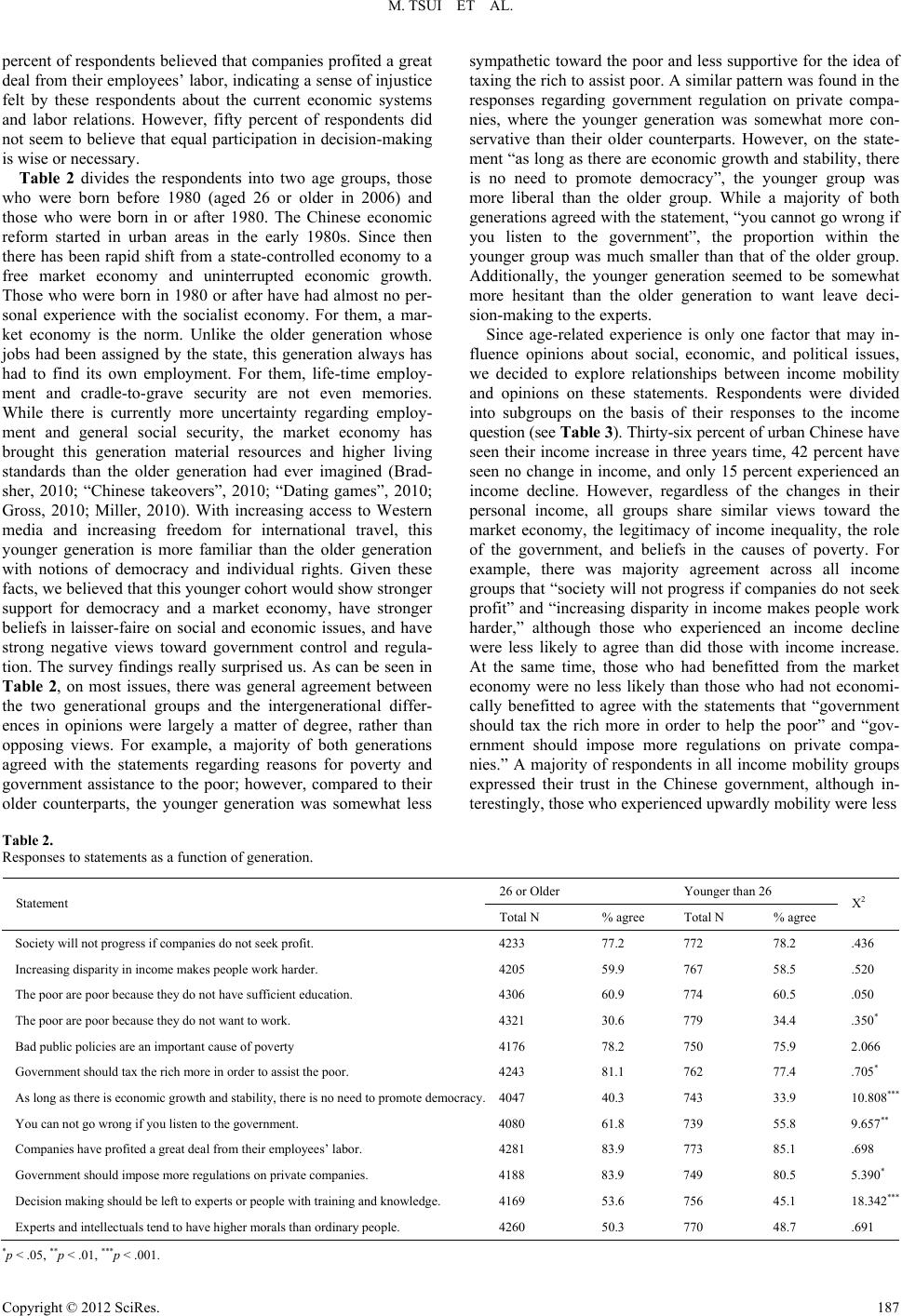 M. TSUI ET AL. percent of respondents believed that companies profited a great deal from their employees’ labor, indicating a sense of injustice felt by these respondents about the current economic systems and labor relations. However, fifty percent of respondents did not seem to believe that equal participation in decision-making is wise or necessary. Table 2 divides the respondents into two age groups, those who were born before 1980 (aged 26 or older in 2006) and those who were born in or after 1980. The Chinese economic reform started in urban areas in the early 1980s. Since then there has been rapid shift from a state-controlled economy to a free market economy and uninterrupted economic growth. Those who were born in 1980 or after have had almost no per- sonal experience with the socialist economy. For them, a mar- ket economy is the norm. Unlike the older generation whose jobs had been assigned by the state, this generation always has had to find its own employment. For them, life-time employ- ment and cradle-to-grave security are not even memories. While there is currently more uncertainty regarding employ- ment and general social security, the market economy has brought this generation material resources and higher living standards than the older generation had ever imagined (Brad- sher, 2010; “Chinese takeovers”, 2010; “Dating games”, 2010; Gross, 2010; Miller, 2010). With increasing access to Western media and increasing freedom for international travel, this younger generation is more familiar than the older generation with notions of democracy and individual rights. Given these facts, we believed that this younger cohort would show stronger support for democracy and a market economy, have stronger beliefs in laisser-faire on social and economic issues, and have strong negative views toward government control and regula- tion. The survey findings really surprised us. As can be seen in Table 2, on most issues, there was general agreement between the two generational groups and the intergenerational differ- ences in opinions were largely a matter of degree, rather than opposing views. For example, a majority of both generations agreed with the statements regarding reasons for poverty and government assistance to the poor; however, compared to their older counterparts, the younger generation was somewhat less sympathetic toward the poor and less supportive for the idea of taxing the rich to assist poor. A similar pattern was found in the responses regarding government regulation on private compa- nies, where the younger generation was somewhat more con- servative than their older counterparts. However, on the state- ment “as long as there are economic growth and stability, there is no need to promote democracy”, the younger group was more liberal than the older group. While a majority of both generations agreed with the statement, “you cannot go wrong if you listen to the government”, the proportion within the younger group was much smaller than that of the older group. Additionally, the younger generation seemed to be somewhat more hesitant than the older generation to want leave deci- sion-making to the experts. Since age-related experience is only one factor that may in- fluence opinions about social, economic, and political issues, we decided to explore relationships between income mobility and opinions on these statements. Respondents were divided into subgroups on the basis of their responses to the income question (see Table 3). Thirty-six percent of urban Chinese have seen their income increase in three years time, 42 percent have seen no change in income, and only 15 percent experienced an income decline. However, regardless of the changes in their personal income, all groups share similar views toward the market economy, the legitimacy of income inequality, the role of the government, and beliefs in the causes of poverty. For example, there was majority agreement across all income groups that “society will not progress if companies do not seek profit” and “increasing disparity in income makes people work harder,” although those who experienced an income decline were less likely to agree than did those with income increase. At the same time, those who had benefitted from the market economy were no less likely than those who had not economi- cally benefitted to agree with the statements that “government should tax the rich more in order to help the poor” and “gov- ernment should impose more regulations on private compa- nies.” A majority of respondents in all income mobility groups expressed their trust in the Chinese government, although in- terestingly, those who experienced upwardly mobility were less Table 2. Responses to statements as a function of generation. 26 or Older Younger than 26 Statement Total N % agree Total N % agree X2 Society will not progress if companies do not seek profit. 4233 77.2 772 78.2 .436 Increasing disparity in income makes people work harder. 4205 59.9 767 58.5 .520 The poor are poor because they do not have sufficient education. 4306 60.9 774 60.5 .050 The poor are poor because they do not want to work. 4321 30.6 779 34.4 .350* Bad public policies are an important cause of poverty 4176 78.2 750 75.9 2.066 Government should tax the rich more in order to assist the poor. 4243 81.1 762 77.4 .705* As long as there is economic growth and stability, there is no need to promote democracy.4047 40.3 743 33.9 10.808*** You can not go wrong if you listen to the government. 4080 61.8 739 55.8 9.657** Companies have profited a great deal from their employees’ labor. 4281 83.9 773 85.1 .698 Government should impose more regulations on private companies. 4188 83.9 749 80.5 5.390* Decision making should be left to experts or people with training and knowledge. 4169 53.6 756 45.1 18.342*** Experts and intellectuals tend to have higher morals than ordinary people. 4260 50.3 770 48.7 .691 *p < .05, **p < .01, ***p < .001. Copyright © 2012 SciRes. 187 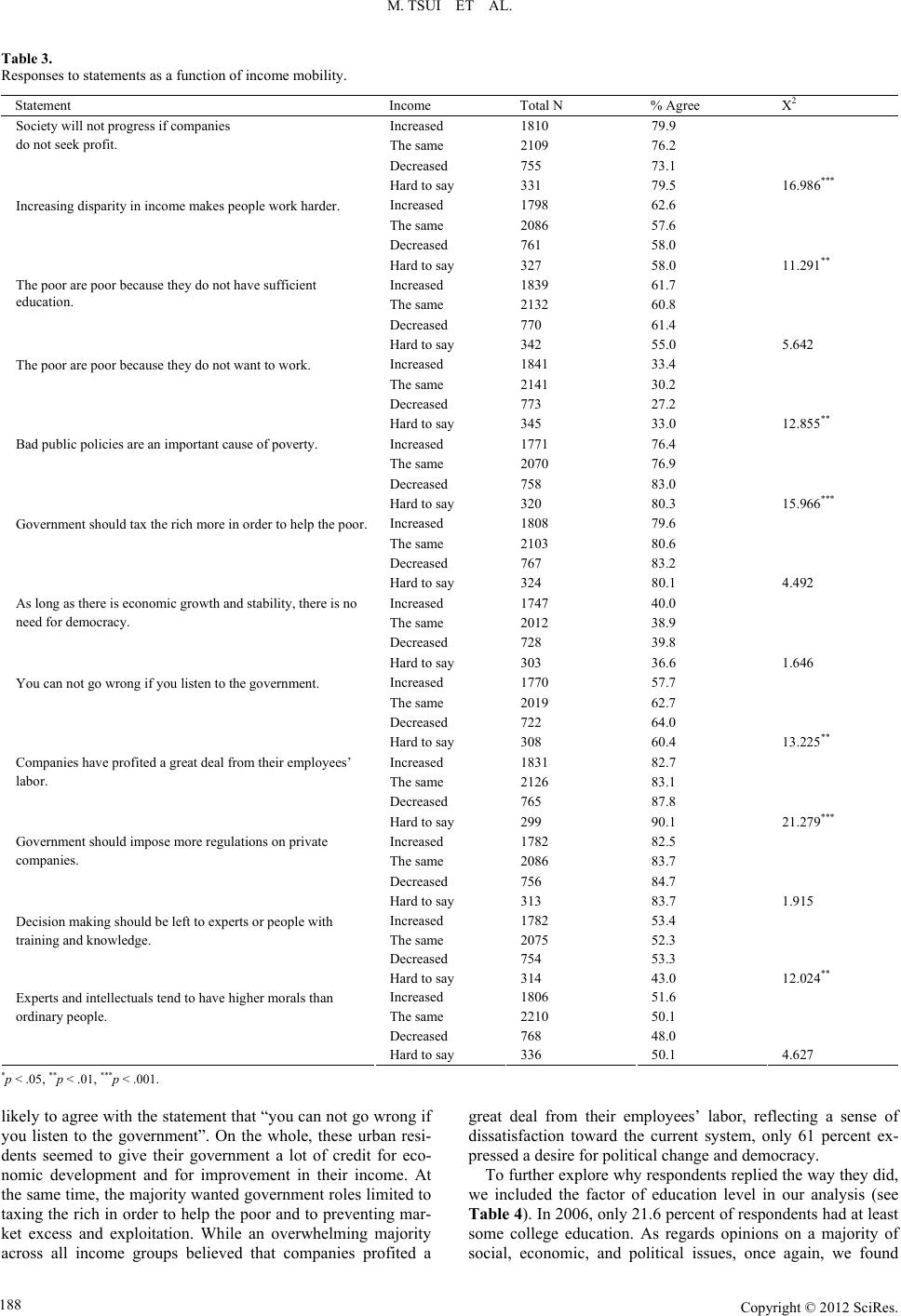 M. TSUI ET AL. Table 3. Responses to statements as a function of income mobility. Statement Income Total N % Agree X2 Increased 1810 79.9 The same 2109 76.2 Decreased 755 73.1 Society will not progress if companies do not seek profit. Hard to say 331 79.5 16.986*** Increased 1798 62.6 The same 2086 57.6 Decreased 761 58.0 Increasing disparity in income makes people work harder. Hard to say 327 58.0 11.291** Increased 1839 61.7 The same 2132 60.8 Decreased 770 61.4 The poor are poor because they do not have sufficient education. Hard to say 342 55.0 5.642 Increased 1841 33.4 The same 2141 30.2 Decreased 773 27.2 The poor are poor because they do not want to work. Hard to say 345 33.0 12.855** Increased 1771 76.4 The same 2070 76.9 Decreased 758 83.0 Bad public policies are an important cause of poverty. Hard to say 320 80.3 15.966*** Increased 1808 79.6 The same 2103 80.6 Decreased 767 83.2 Government should tax the rich more in order to help the poor. Hard to say 324 80.1 4.492 Increased 1747 40.0 The same 2012 38.9 Decreased 728 39.8 As long as there is economic growth and stability, there is no need for democracy. Hard to say 303 36.6 1.646 Increased 1770 57.7 The same 2019 62.7 Decreased 722 64.0 You can not go wrong if you listen to the government. Hard to say 308 60.4 13.225** Increased 1831 82.7 The same 2126 83.1 Decreased 765 87.8 Companies have profited a great deal from their employees’ labor. Hard to say 299 90.1 21.279*** Increased 1782 82.5 The same 2086 83.7 Decreased 756 84.7 Government should impose more regulations on private companies. Hard to say 313 83.7 1.915 Increased 1782 53.4 The same 2075 52.3 Decreased 754 53.3 Decision making should be left to experts or people with training and knowledge. Hard to say 314 43.0 12.024** Increased 1806 51.6 The same 2210 50.1 Decreased 768 48.0 Experts and intellectuals tend to have higher morals than ordinary people. Hard to say 336 50.1 4.627 *p < .05, **p < .01, ***p < .001. likely to agree with the statement that “you can not go wrong if you listen to the government”. On the whole, these urban resi- dents seemed to give their government a lot of credit for eco- nomic development and for improvement in their income. At the same time, the majority wanted government roles limited to taxing the rich in order to help the poor and to preventing mar- ket excess and exploitation. While an overwhelming majority across all income groups believed that companies profited a great deal from their employees’ labor, reflecting a sense of dissatisfaction toward the current system, only 61 percent ex- pressed a desire for political change and democracy. To further explore why respondents replied the way they did, we included the factor of education level in our analysis (see Table 4). In 2006, only 21.6 percent of respondents had at least some college education. As regards opinions on a majority of social, economic, and political issues, once again, we found Copyright © 2012 SciRes. 188 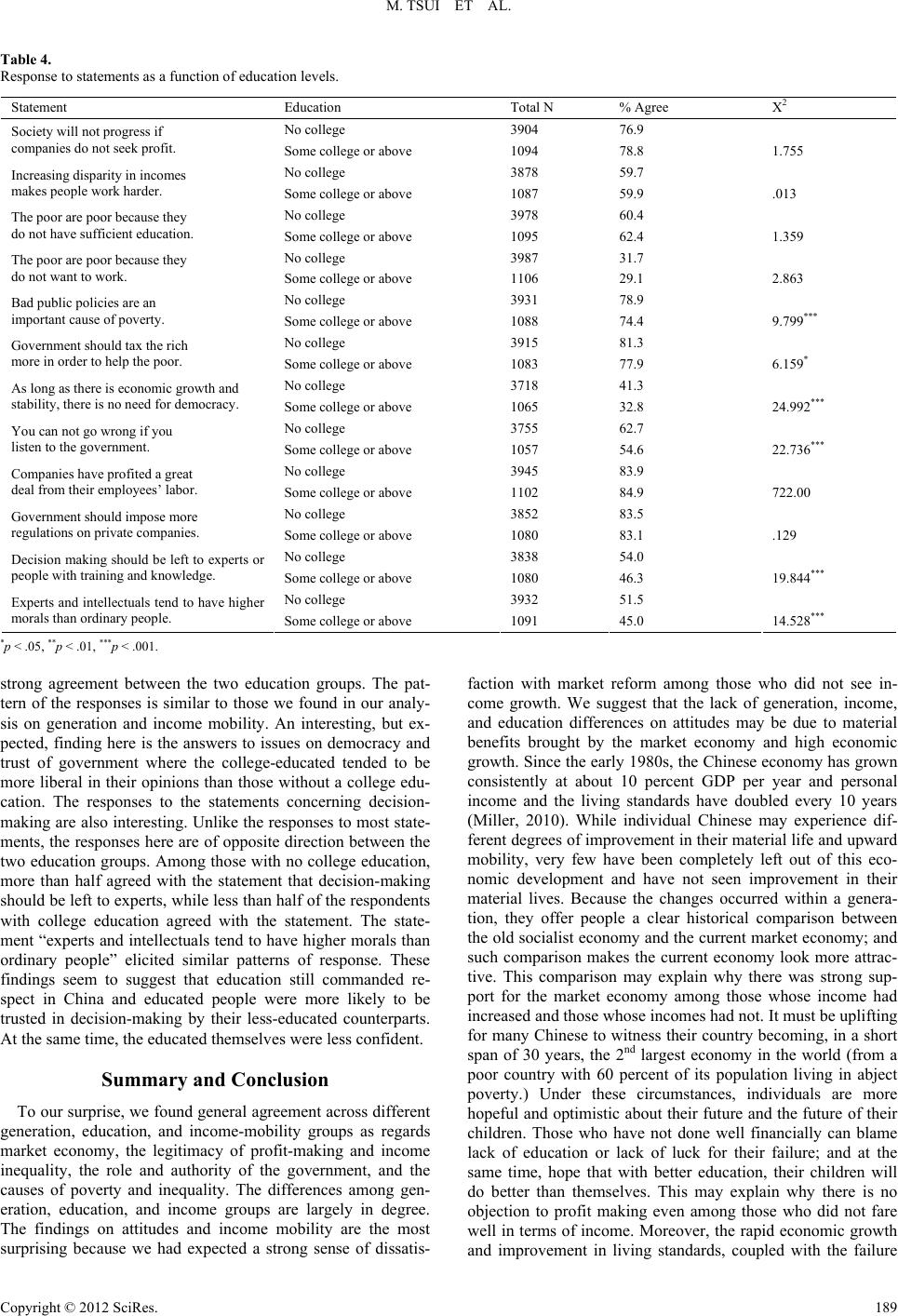 M. TSUI ET AL. Table 4. Response to statements as a function of education levels. Statement Education Total N % Agree X2 No college 3904 76.9 Society will not progress if companies do not seek profit. Some college or above 1094 78.8 1.755 No college 3878 59.7 Increasing disparity in incomes makes people work harder. Some college or above 1087 59.9 .013 No college 3978 60.4 The poor are poor because they do not have sufficient education. Some college or above 1095 62.4 1.359 No college 3987 31.7 The poor are poor because they do not want to work. Some college or above 1106 29.1 2.863 No college 3931 78.9 Bad public policies are an important cause of poverty. Some college or above 1088 74.4 9.799*** No college 3915 81.3 Government should tax the rich more in order to help the poor. Some college or above 1083 77.9 6.159* No college 3718 41.3 As long as there is economic growth and stability, there is no need for democracy. Some college or above 1065 32.8 24.992*** No college 3755 62.7 You can not go wrong if you listen to the government. Some college or above 1057 54.6 22.736*** No college 3945 83.9 Companies have profited a great deal from their employees’ labor. Some college or above 1102 84.9 722.00 No college 3852 83.5 Government should impose more regulations on private companies. Some college or above 1080 83.1 .129 No college 3838 54.0 Decision making should be left to experts or people with training and knowledge. Some college or above 1080 46.3 19.844*** No college 3932 51.5 Experts and intellectuals tend to have higher morals than ordinary people. Some college or above 1091 45.0 14.528*** *p < .05, **p < .01, ***p < .001. strong agreement between the two education groups. The pat- tern of the responses is similar to those we found in our analy- sis on generation and income mobility. An interesting, but ex- pected, finding here is the answers to issues on democracy and trust of government where the college-educated tended to be more liberal in their opinions than those without a college edu- cation. The responses to the statements concerning decision- making are also interesting. Unlike the responses to most state- ments, the responses here are of opposite direction between the two education groups. Among those with no college education, more than half agreed with the statement that decision-making should be left to experts, while less than half of the respondents with college education agreed with the statement. The state- ment “experts and intellectuals tend to have higher morals than ordinary people” elicited similar patterns of response. These findings seem to suggest that education still commanded re- spect in China and educated people were more likely to be trusted in decision-making by their less-educated counterparts. At the same time, the educated themselves were less confident. Summary and Conclusion To our surprise, we found general agreement across different generation, education, and income-mobility groups as regards market economy, the legitimacy of profit-making and income inequality, the role and authority of the government, and the causes of poverty and inequality. The differences among gen- eration, education, and income groups are largely in degree. The findings on attitudes and income mobility are the most surprising because we had expected a strong sense of dissatis- faction with market reform among those who did not see in- come growth. We suggest that the lack of generation, income, and education differences on attitudes may be due to material benefits brought by the market economy and high economic growth. Since the early 1980s, the Chinese economy has grown consistently at about 10 percent GDP per year and personal income and the living standards have doubled every 10 years (Miller, 2010). While individual Chinese may experience dif- ferent degrees of improvement in their material life and upward mobility, very few have been completely left out of this eco- nomic development and have not seen improvement in their material lives. Because the changes occurred within a genera- tion, they offer people a clear historical comparison between the old socialist economy and the current market economy; and such comparison makes the current economy look more attrac- tive. This comparison may explain why there was strong sup- port for the market economy among those whose income had increased and those whose incomes had not. It must be uplifting for many Chinese to witness their country becoming, in a short span of 30 years, the 2nd largest economy in the world (from a poor country with 60 percent of its population living in abject poverty.) Under these circumstances, individuals are more hopeful and optimistic about their future and the future of their children. Those who have not done well financially can blame lack of education or lack of luck for their failure; and at the same time, hope that with better education, their children will do better than themselves. This may explain why there is no objection to profit making even among those who did not fare well in terms of income. Moreover, the rapid economic growth and improvement in living standards, coupled with the failure Copyright © 2012 SciRes. 189 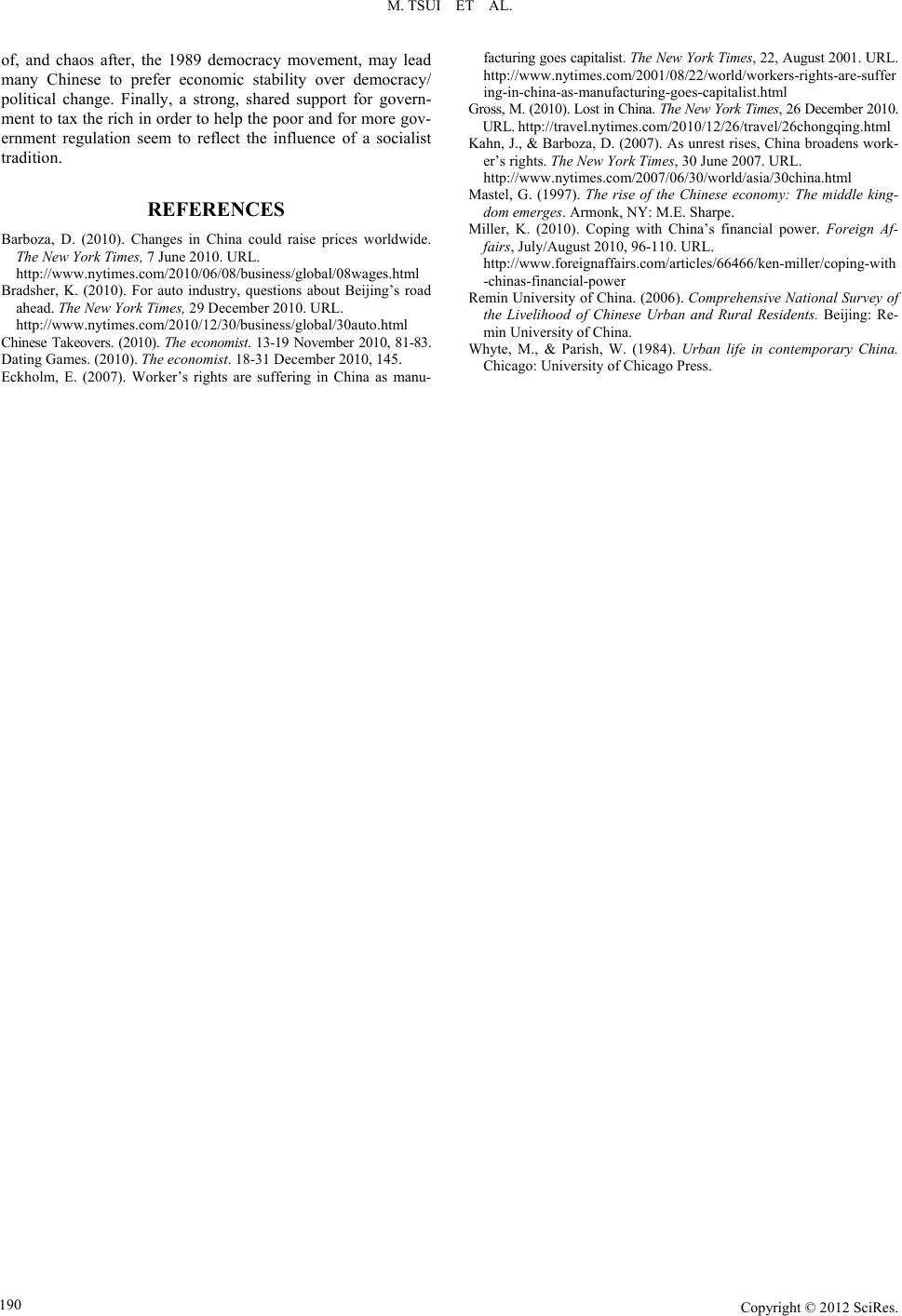 M. TSUI ET AL. of, and chaos after, the 1989 democracy movement, may lead many Chinese to prefer economic stability over democracy/ political change. Finally, a strong, shared support for govern- ment to tax the rich in order to help the poor and for more gov- ernment regulation seem to reflect the influence of a socialist tradition. REFERENCES Barboza, D. (2010). Changes in China could raise prices worldwide. The New York Times, 7 June 2010. URL. http://www.nytimes.com/2010/06/08/business/global/08wages.html Bradsher, K. (2010). For auto industry, questions about Beijing’s road ahead. The New York Times, 29 December 2010. URL. http://www.nytimes.com/2010/12/30/business/global/30auto.html Chinese Takeovers. (2010). The economist. 13-19 November 2010, 81-83. Dating Games. (2010). The economist. 18-31 December 2010, 145. Eckholm, E. (2007). Worker’s rights are suffering in China as manu- facturing goes capitalist. The New York Times, 22, August 2001. URL. http://www.nytimes.com/2001/08/22/world/workers-rights-are-suffer ing-in-china-as-manufacturing-goes-capitalist.html Gross, M. (2010). Lost in China. The New York Times, 26 December 2010. URL. http://travel.nytimes.com/2010/12/26/travel/26chongqing.html Kahn, J., & Barboza, D. (2007). As unrest rises, China broadens work- er’s rights. The New York Times, 30 June 2007. URL. http://www.nytimes.com/2007/06/30/world/asia/30china.html Mastel, G. (1997). The rise of the Chinese economy: The middle king- dom emerges. Armonk, NY: M.E. Sharpe. Miller, K. (2010). Coping with China’s financial power. Foreign Af- fairs, July/August 2010, 96-110. URL. http://www.foreignaffairs.com/articles/66466/ken-miller/coping-with -chinas-financial-power Remin University of China. (2006). Comprehensive National Survey of the Livelihood of Chinese Urban and Rural Residents. Beijing: Re- min University of China. Whyte, M., & Parish, W. (1984). Urban life in contemporary China. Chicago: University of Chicago Press. Copyright © 2012 SciRes. 190 |

